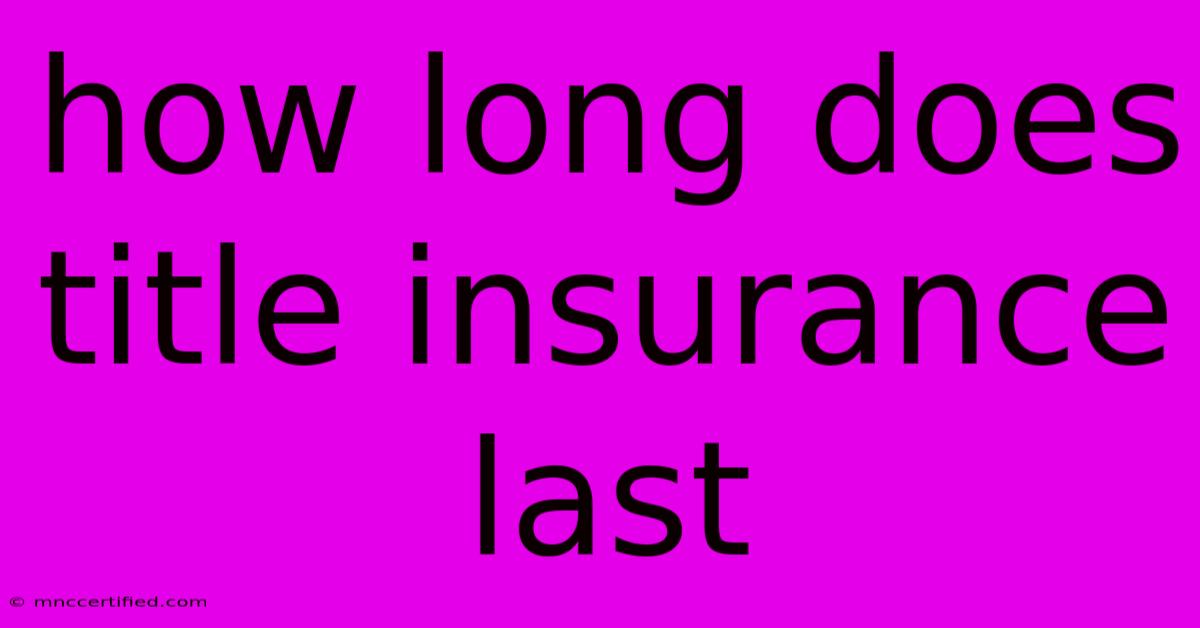How Long Does Title Insurance Last

Table of Contents
How Long Does Title Insurance Last? A Comprehensive Guide
Buying a home is a significant investment, and protecting that investment is paramount. Title insurance plays a crucial role in this protection, but many homeowners wonder: how long does title insurance last? The simple answer is: for as long as you or your heirs own the property. However, there are nuances to this seemingly straightforward answer that we'll explore in detail.
Understanding Title Insurance: A Quick Overview
Before diving into the duration of coverage, let's briefly understand what title insurance is. Title insurance protects you against financial losses stemming from defects or problems with your property's title. These defects could include:
- Forged documents: A fraudulent deed or other document affecting ownership.
- Unpaid taxes or liens: Outstanding debts that could impact your ownership.
- Encroachments: Structures built on your property that actually belong to a neighbor.
- Errors in public records: Mistakes in the official documents describing your property's ownership.
Essentially, it acts as a safety net, ensuring that your ownership is legally sound and protecting you from costly legal battles.
Two Types of Title Insurance: Owner's and Lender's
There are two main types of title insurance policies:
Owner's Title Insurance
This policy protects you, the homeowner, against title defects discovered after you purchase the property. This is the policy that lasts for as long as you (or your heirs) own the property. It's a one-time premium payment that provides lifelong coverage. This is the policy you should focus on when considering the longevity of title insurance protection.
Lender's Title Insurance
This policy protects the lender who provides your mortgage. It covers the lender's financial interest in the property. This policy typically expires once the mortgage is paid off.
The Lifelong Protection of Owner's Title Insurance: What it Covers
The longevity of owner's title insurance is a significant benefit. This ongoing protection covers:
- Future title defects: Even if a problem arises years after the purchase, your policy will help cover the costs of resolving it.
- Inheritance: The coverage typically extends to your heirs, providing continued protection for your family.
- Peace of mind: Knowing you have this protection can significantly reduce stress and anxiety associated with homeownership.
What Owner's Title Insurance Doesn't Cover
While owner's title insurance provides extensive protection, it's crucial to understand its limitations. It generally does not cover:
- Problems you knew about before closing: If you were aware of a potential title issue before purchasing the property, the insurance likely won't cover it.
- Issues arising from your actions: Problems resulting from your own actions (like failing to pay property taxes) aren't covered.
- Changes in zoning laws: Government regulations impacting your property use are not covered by title insurance.
Maximizing Your Title Insurance Protection
To ensure you're getting the most out of your title insurance, consider:
- Choosing a reputable title insurance company: Research and select a company with a strong track record and positive customer reviews.
- Reviewing your policy carefully: Understand the terms and conditions of your policy to avoid any surprises.
- Understanding the claims process: Familiarize yourself with how to file a claim in case a title issue arises.
Conclusion: Long-Term Security for Your Home Investment
In conclusion, owner's title insurance lasts for as long as you or your heirs own the property. This provides invaluable long-term protection for one of your most significant assets. Understanding the specifics of your policy and the limitations of coverage will help you leverage this crucial aspect of homeownership to its fullest extent. Remember to choose a reputable company and carefully review your policy to ensure you have the peace of mind that comes with knowing your investment is protected.

Thank you for visiting our website wich cover about How Long Does Title Insurance Last. We hope the information provided has been useful to you. Feel free to contact us if you have any questions or need further assistance. See you next time and dont miss to bookmark.
Featured Posts
-
Davina Mc Call Brain Tumor Operation
Nov 16, 2024
-
Vaccine Skeptic Rfk Jr For Health Chief
Nov 16, 2024
-
Premier Insurance Group Agency Llc
Nov 16, 2024
-
Foremost Insurance Company Florida
Nov 16, 2024
-
Speech Therapy Cost With Insurance
Nov 16, 2024